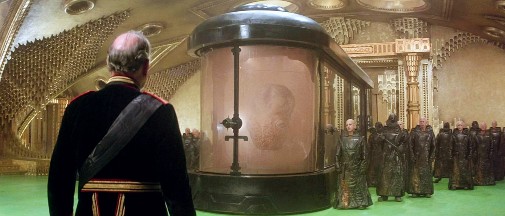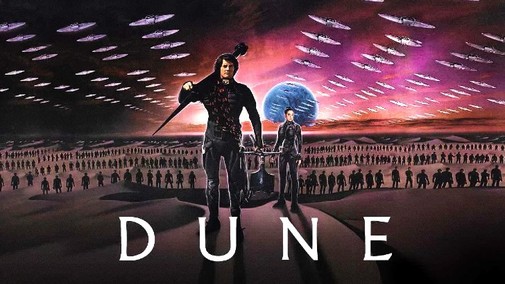How Had I Never Seen..."Dune"?
 Thursday, October 28, 2021 at 10:54PM
Thursday, October 28, 2021 at 10:54PM Audiences are here for Denis Villeneuve's take of Frank Herbert's Dune – its first half, to be specific. Box office numbers already guaranteed the filming of its sequel, and now there are even talks of a third movie, adapting the second book in the series, Dune Messiah. As the world goes mad for spice and space twinks, Goth nuns, and more made-up sci-fi terminology than you can shake a stick at, it feels like a good time to look at the last big-screen adaptation of Herbert's genre-defining novel. While much hated by its maker, David Lynch's Dune has gained quite the cult following over the years. Indeed, researching this piece, I came across plenty of retrospective defenses of the movie's merits, passionate screeds against its maligned critical reputation.
Does the flick earn such reappraisals, or were the initial reactions right all along? Well…
Fascinating as it might be, comparing the two Dunes seems vaguely futile. Lynch, Villeneuve, and their production teams were going for such antithetical approaches that the two movies are like a pair of wild animals belonging to distinct species, maybe even different hemispheres, perchance planets. While the 2021 movie is all about distilling a more or less streamlined plot from Herbert's filigreed prose, emphasizing naked grandeur and narrative efficiency, action above too much verbose self-reflection, the 1984 does almost the exact opposite. Oriented by the commercial ambitions of Dino and Rafaella De Laurentis, Lynch condenses the story into mushy psychedelia, weighted down by inelegant exposition piled on top of voice-over narration and interior monologues.
The belabored screenplay is an unholy miracle of foolhardy adaptation, its mistakes resulting in some tones and rhythms that are more interesting to dissect than to experience. It all starts in something like a parody of Eraserhead. A floating head, lost in space, talks directly to the camera. She's Virginia Madsen as Princess Irulan, daughter of the Padishah Emperor Shaddam IV. In fits and starts, tripping over some sad attempts at humor, she tells us of the known universe in the distant future of 10,91, establishing what world-building we need to know heading into the plot. She's an exposition dump, barely existing as a character outside her role as narrator. For such a visual director, it's remarkable how much Lynch insists on telling rather than showing.
In any case, from then on, we go, visiting planet after planet, getting glimpses of the political machinations intrinsic to the material while feeling next to no sense of doomed tragedy about all these meat sacks parading before our eyes. It's dispiritingly cold, but there's a curious quality that emerges from such mechanical storytelling. The characters aren't alienating in the way undeveloped ciphers are. Instead, they're like otherworldly beings whose customs, reason, and social codes are so distant that one can't engage with them, just observing and never understanding. I don't know about you, but that level of abrasive disconnect seems right for such dense sci-fi philosophizing as Dune. They feel wrong, uncanny even, which is pretty perfect in this context.

The cast members who get a good grasp of the material make great use of the human drama's inhumanity. Siân Phillips synthesizes the hubris of the Bene Gesserit in her voracious Reverend Mother Gaius Helen Mohiam. Dean Stockwell does remarkable things with Dr. Yueh despite the miscasting, playing inner tragedy, and outward rigidity with eerie precision. Brad Dourif's insectoid hunger as Piter De Vries perturbs, as does Sting's wild-eyed ever-smiling performance of Feyd. From the principal roles, Francesa Annis gets knee-capped by the voice-over, but there's a detached ardor to her Lady Jessica that entices and draws the eye. Finally, it's not so much a performance as a miracle of sound design, but little Alicia Witt as Alia is just as monstrous as I'd hoped.
On the flip-side, Sean Young is a non-entity as Chani. As for Kyle MacLachlan, he's part of a tradition of actors unable to solve the quandaries of the young Paul Atreides, an impossible role in every adaptation of this novel. Still, the worst of the worst is Kenneth McMillan's Baron. He's giving the most distinctively Lynchian of all performances, but the man transcends unnerving grotesque to reach a carnivalesque absurdity that's all wrong for the movie around him. Say what you want about overbearing self-seriousness, but Dune's not a text prone to comedy. So forcing it on the material ends up feeling inorganic, a distracting error rather than a canny variation. Also, his death scene is absurd, like the space opera tripped and became a Looney Tunes cartoon for a hot second.

If the performances are a heterogeneous collection of triumphs and failures, the design elements are more consistently winning. It's here that Lynch's touch is most heavily felt, though the general ostentation also recalls De Laurentis' other attempts at capitalizing on Star Wars popularity. Production designer Anthony Masters has created an airless world, all hermetically sealed rooms where people get trapped within their asphyxiating notions of nobility, birthright, golden utopias. It's also an old world, not gritty in the same wavelength as Star Wars and Alien to a certain extent. No, Masters' galactical empire repudiates fairytale simplicity and visceral horror. Instead, it smells like decay and tastes of death in shades of burnished gold. Its texture is disgusting and vulgar at the same time, like a corpse covered in jewels that are slowly submerged by the decomposition fluids. Watching the movie, one feels as trapped as the characters.
Bob Ringwood's costumes are even better, contextualizing some of the clunkier effects (the worms are great, though) within a milieu of theatricality. Clothes are never just clothes, but costumes worn by self-aware actors in a performance of history. Furthermore, most of the designs look to the past in order to imagine the future, sometimes with shocking literalness. Irulan wears late Elizabethan gowns for no apparent reason, while the Bene Gesserit sisterhood clothes itself in strange combinations of Grecian pleats and Tudor-esque French hoods. While the orientalist flair intrinsic to the book is there, it's philtered through so many other references as to become indissociable from the hallucinations of European fashion, the out-of-place sex appeal of a winged speedo, or the fetishistic mixes of garb and machinery.
That weirdness is what makes this Dune so unique and easy to root for. It's the design and the quirks peppered throughout - vision quests, rotting faces, cat milking, and the like. The big problems are script and structure, not to mention a myriad of artistic compromises. The aforementioned inclusions of narration and inner monologue come as an attempt to translate the chaotic manner in which Herbert alternates perspectives throughout his prose. Such fidelity hurts the movie, tethering it to a literary mechanism that doesn't work on film. That's especially true in the first half, which consists of endless exposition that sometimes doubles on itself, resulting in redundancy. The second half has the opposite issue, speeding through the plot so feverishly as to render it incomprehensible.

Reducing a years-long desert narrative to never-ending montages occasionally interspersed with short scenes is a bold choice, though not a good one. Had I not read the book, I'm not sure this portion of the film would have been possible to follow. And yet, had I not read the book, I'd probably be more forgiving of that damned ending where Lynch and company manage to contradict one of Dune's central ideas. Paul isn't supposed to be a god, but a human with human faults who's turned into a messianic figure by centuries of social engineering. His chosen one status is meant to be artificial, empty, and, in the end, destructive beyond belief. It's a critique of religion and the political power of charismatic leaders.
To make Paul a divine hero with god-like might, as Dune 1984 does, warps the material in such ways as to render it meaningless. What's worse, retconning the story into a hero's journey makes the movie more banal and less interesting. It's a pity because the weirdness of the project, its unconventional quirks are its most significant selling point. In the end, while I can understand why people are drawn to David Lynch's Dune, I can't count myself among its fans. It fails as a stand-alone movie, and it fails as an adaptation. Even I can't excuse all of that just because the costumes are fabulous. What about you? If you're a fan, please try to change my mind in the comments. I'd love to love this unloved flick.

David Lynch's Dune is streaming on Crave and Starz. You can also rent it on several services. As for the new movie, it's currently in theaters and HBO Max.





Reader Comments (4)
It's a complete turkey. I prefer Villeneuve's take by every conceivable metric.
Having now seen Villeneuve's version, I would say that Villeneuve was the one who got it right as I think Lynch tried to make it accessible and also weird at times but he ended up being constrained by his limitations as the portrayal of the Harkkonens in his film were cartoonish in comparison to what Villeneuve had done with them as they definitely feel like a threat. I heard Barry Keoghan is going to play Fey-Ruad Harkkonen in the upcoming 2nd part as that is some interesting casting. Way better than Sting who just looked ridiculous.
I love the Lynch version, but as a disasterpiece, not a masterpiece. In that way it stands on my DVD/Blu-ray shelves alongside MYRA BRECKINRIDGE, LOST HORIZONS (70s version), and THE MOON IN THE GUTTER as a film that fails on almost every conceivable level, but somehow works as a spellbinding piece of cinema anyway. It's as if von Stroheim, von Sternberg, or Eisenstein had wound up doing a film for Golan-Globus and still tried to maintain his artistic integrity. The bad acting, bad special effects, patchwork screenplay and editing along with a huge budget for sets, costumes and top level acting talent, all conspire to undermine it but it still has a vision. As Richard Brody implies in his takedown of the new DUNE, at least the Lynch film has an unconscious. It's made by a talented pervert and the talent and perversion show. As for the ending, I think it comes across as suck a tack on, especially with the big rainstorm, that it's not to be taken seriously. It's as if Lynch is trying to wink at the audience. If he had in some crazy alternative universe gotten to make a sequel, he would have pulled the rug out from under his audience pretty quickly.
I love the Lynch version, but as a disasterpiece, not a masterpiece. In that way it stands on my DVD/Blu-ray shelves alongside MYRA BRECKINRIDGE, THE SERPENT'S EGG, and THE MOON IN THE GUTTER as a film that fails on almost every conceivable level, but somehow works as spellbinding cinema anyway. It's as if von Stroheim, von Sternberg, or Eisenstein had wound up doing a film for Golan-Globus and still tried to maintain his artistic integrity. The bad acting, bad special effects, patchwork screenplay and editing along with a huge budget for sets, costumes and top level acting talent, all conspire to undermine it, but it still offers a powerful oneiric vision. As Richard Brody implies in his takedown of the new DUNE, at least the Lynch film has an unconscious. It's made by a talented pervert and the talent and perversion show. As for the ending, I think it comes across as suck a tack on, especially with the big rainstorm, that it's not to be taken seriously. It's as if Lynch is trying to wink at the audience. If he had, in some crazy alternative universe, gotten to make a sequel, he would have no-doubt pulled the rug out from under his audience pretty quickly.